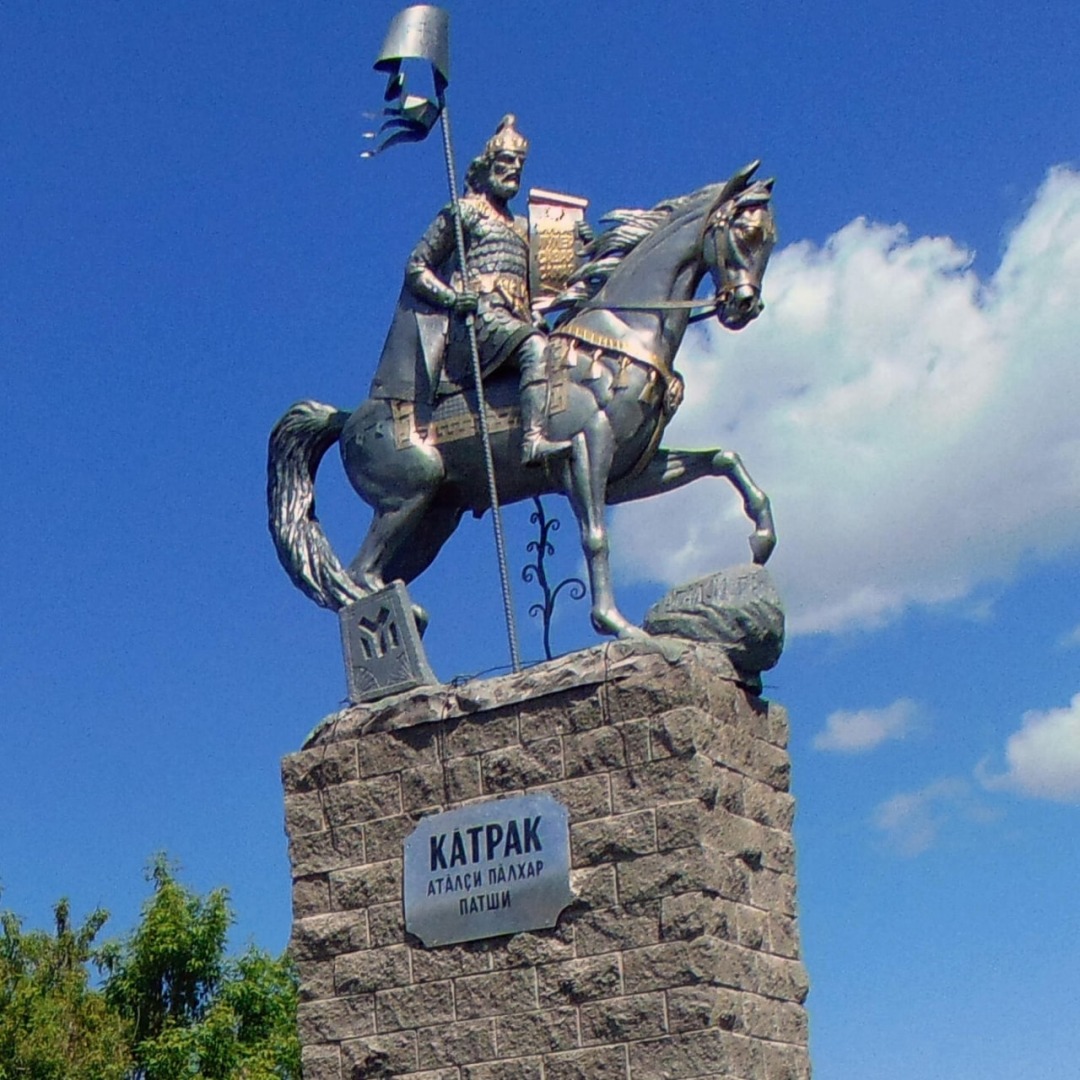Kotrag on:
[Wikipedia]
[Google]
[Amazon]
 Kotrag was according to
Kotrag was according to
File:Monument to Kotrag 3.jpg, Opening of the monument to Khan Kotrag in the Chuvash Republic, the village of Shemursha, in memory of the founder of the Volga Bulgaria. July, 12. 2022
File:Monument to Kotrag 2.jpg, Monument to the founder of the Volga Bulgaria Khan Kotrag in the Chuvash Republic
 Kotrag was according to
Kotrag was according to Nikephoros I of Constantinople
Nikephoros I or Nicephorus I (c. 758 – 5 April 828) was a Byzantine writer and patriarch of Constantinople from 12 April 806 to 13 March 815.
Life
He was born in Constantinople as the son of Theodore and Eudokia, of a strictly Orthodox fa ...
a son of Kubrat
Kubrat ( el, خڑخ؟خ²دپل¾¶د„خ؟د‚, Kخ؟دچخ²دپخ±د„خ؟د‚; bg, ذڑرƒذ±ر€ذ°ر‚ ) was the ruler of the Onogur–Bulgars, credited with establishing the confederation of Old Great Bulgaria in ca. 632. His name derived from the Turkic words ''qobrat'' — ...
of the Dulo clan of Bulgars
The Bulgars (also Bulghars, Bulgari, Bolgars, Bolghars, Bolgari, Proto-Bulgarians) were Turkic semi-nomadic warrior tribes that flourished in the Pontic–Caspian steppe and the Volga region during the 7th century. They became known as noma ...
. Following the death of his father, he began to extend the influence of his Bulgars to the Volga River
The Volga (; russian: ذ’ذ¾جپذ»ذ³ذ°, a=Ru-ذ’ذ¾ذ»ذ³ذ°.ogg, p=ثˆvoة«ة،ة™) is the longest river in Europe. Situated in Russia, it flows through Central Russia to Southern Russia and into the Caspian Sea. The Volga has a length of , and a catch ...
. He is remembered as the founder of Volga Bulgaria
Volga Bulgaria or Volga–Kama Bulgaria, was a historic Bulgar state that existed between the 7th and 13th centuries around the confluence of the Volga and Kama River, in what is now European Russia. Volga Bulgaria was a multi-ethnic state ...
.
Honour
*Kotrag Nunatak
Kotrag Nunatak (Nunatak Kotrag \'nu-na-tak ko-'trag\) is a conspicuous rocky peak of elevation 290 m projecting from Murgash Glacier, Greenwich Island in the South Shetland Islands, Antarctica. It was named after Khan Kotrag, founder of the King ...
on Greenwich Island in the South Shetland Islands
The South Shetland Islands are a group of Antarctic islands with a total area of . They lie about north of the Antarctic Peninsula, and between southwest of the nearest point of the South Orkney Islands. By the Antarctic Treaty of 1 ...
, Antarctica
Antarctica () is Earth's southernmost and least-populated continent. Situated almost entirely south of the Antarctic Circle and surrounded by the Southern Ocean, it contains the geographic South Pole. Antarctica is the fifth-largest cont ...
is named after Kotrag.
* In the Republic of Chuvashia in the village of Shemursha on June 12, 2022, a monument
A monument is a type of structure that was explicitly created to commemorate a person or event, or which has become relevant to a social group as a part of their remembrance of historic times or cultural heritage, due to its artistic, hist ...
was erected to the founder of the Volga
The Volga (; russian: ذ’ذ¾جپذ»ذ³ذ°, a=Ru-ذ’ذ¾ذ»ذ³ذ°.ogg, p=ثˆvoة«ة،ة™) is the longest river in Europe. Situated in Russia, it flows through Central Russia to Southern Russia and into the Caspian Sea. The Volga has a length of , and a catch ...
Bulgaria - Kotrag
Name
The possible origin of the name ofkhan
Khan may refer to:
*Khan (inn), from Persian, a caravanserai or resting-place for a travelling caravan
*Khan (surname), including a list of people with the name
*Khan (title), a royal title for a ruler in Mongol and Turkic languages and used by ...
Kotrag from the Chuvash name ''Kؤƒtrak'' and ''Kؤƒtrashka'', which in translation means ''Curly'', a common pre-Christian name among the Chuvash. In the Kipchak languages, the word ''Curly'' is translated as tat. Bodrس™ (''ذ‘س©ذ´ر€س™)'' on kaz.Buyra (''ذ‘ز±ذ¹ر€ذ°)''. Perhaps the name Kotrag was given in honor of the great-grandfather Kobrat, who also bore the name Kotrag in honor of whom the whole tribe of Kutrigurs was named.
Procopius
Procopius of Caesarea ( grc-gre, خ دپخ؟خ؛دŒد€خ¹خ؟د‚ ل½پ خڑخ±خ¹دƒخ±دپخµدچد‚ ''Prokأ³pios ho Kaisareأ؛s''; la, Procopius Caesariensis; – after 565) was a prominent late antique Greek scholar from Caesarea Maritima. Accompanying the Roman gen ...
also recorded a genealogical legend according to which:...in the old days many Huns, called then Cimmerians, inhabited the lands I mentioned already. They all had a single king. Once one of their kings had two sons: one called ''Uti oghur'' and another called ''Kutri oghur''. After their father's death they shared the power and gave their names to the subjected peoples, so that even nowadays some of them are calledMany researchers of Chuvash history note a common name beforeUtigurs Utigurs were Turkic nomadic equestrians who flourished in the Pontic–Caspian steppe in the 6th century AD. They possibly were closely related to the Kutrigurs and Bulgars. Etymology The name ''Ut(r)igur'', recorded as , and , is generally con ...and the others -Kutrigurs Kutrigurs were Turkic nomadic equestrians who flourished on the Pontic–Caspian steppe in the 6th century AD. To their east were the similar Utigurs and both possibly were closely related to the Bulgars. They warred with the Byzantine Empire and ....
christian
Christians () are people who follow or adhere to Christianity, a monotheistic Abrahamic religion based on the life and teachings of Jesus Christ. The words ''Christ'' and ''Christian'' derive from the Koine Greek title ''Christأ³s'' (خ§دپخ¹د ...
chuvash as ''Kutri'' ''( chu.Kؤƒر‚ر€ذ¸)'' - which means ''Curly'', perhaps this name is also reflected in Procopius
Procopius of Caesarea ( grc-gre, خ دپخ؟خ؛دŒد€خ¹خ؟د‚ ل½پ خڑخ±خ¹دƒخ±دپخµدچد‚ ''Prokأ³pios ho Kaisareأ؛s''; la, Procopius Caesariensis; – after 565) was a prominent late antique Greek scholar from Caesarea Maritima. Accompanying the Roman gen ...
.
Gallery
References
Dulo clan {{Russia-hist-stub